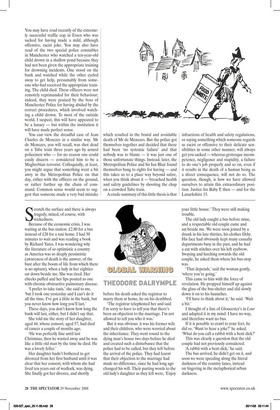THEODORE DALRYMPLE
Scratch the surface and there is always tragedy, mixed, of course, with wickedness.
Because of the economic crisis, I was waiting at the bus station: £2.80 for a bus instead of £28 for a taxi home. I had 50 minutes to wait and was reading a book by Richard Yates. I was wondering why the literature of so optimistic a country as America was so deeply pessimistic (awareness of death is the answer, of the bust after the boom of life from which there is no upturn), when a lady in her eighties sat down beside me. She was tired. Her cheeks puffed and her lips pouted as one with chronic obstructive pulmonary disease.
‘I prefer to take taxis,’ she said to me, ‘but I took one yesterday and I can’t do it all the time. I’ve got a little in the bank, but you never know how long you’ll last.’ These days, you don’t know how long the bank will last, either, but I didn’t say that.
She told me the story of her daughter, aged 44, whose consort, aged 57, had died of cancer a couple of months ago.
‘He was perfectly fine until last Christmas, then he wasted away and he was like a little old man by the time he died. He was a lovely feller.’ Her daughter hadn’t bothered to get divorced from her first husband until it was clear that her consort, with whom she had lived ten years out of wedlock, was dying. She finally got her divorce, and shortly before his death asked the registrar to marry them at home, he on his deathbed.
‘The registrar telephoned her and said I’m sorry to have to tell you that there’s been an objection to the marriage. I’m not allowed to tell you who it was.’ But it was obvious: it was his former wife and their children, who were worried about the inheritance. They went round to the dying man’s house two days before he died and created such a disturbance that the police had to be called, but they left before the arrival of the police. They had learnt that their objection to the marriage had made no difference, since he had long ago changed his will. Their parting words to the old lady’s daughter as they left were, ‘Enjoy your little house.’ They were still making trouble.
The old lady caught a bus before mine, and a respectable old couple came and sat beside me. We were soon joined by a drunk in his late thirties, his clothes filthy. His face had obviously kept many casualty departments busy in the past, and he had a cut with stitches over his left eyebrow. Swaying and lurching towards the old couple, he asked them where his bus-stop was.
‘That depends,’ said the woman gently, ‘where you’re going.’ This came to him with the force of revelation. He propped himself up against the glass of the bus-shelter and slid slowly down it on to his haunches.
‘I’ll have to think about it,’ he said. ‘Wait a bit.’ I thought of a line of Gloucester’s in Lear and adapted it in my mind: I have no way, and therefore want no bus.
If it is possible to crawl to your feet, he did so. ‘Want to hear a joke?’ he asked. ‘What do you call a rabbit with a bent dick?’ This was clearly a question that the old couple had not previously considered.
‘A rabbit with a bent dick,’ he said.
The bus arrived, he didn’t get on it, and soon we were speeding along the literal darkness of the country lanes, instead on lingering in the metaphorical urban darkness.


































































































 Previous page
Previous page